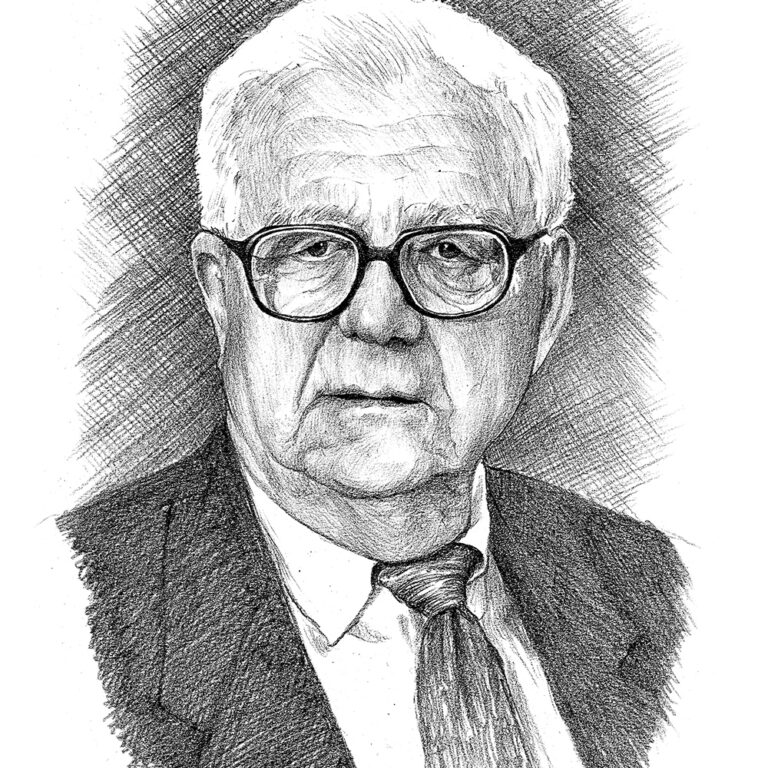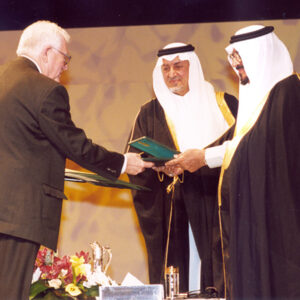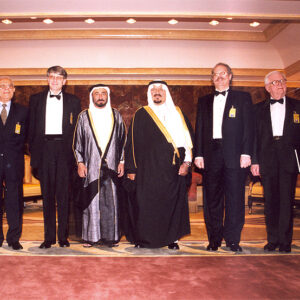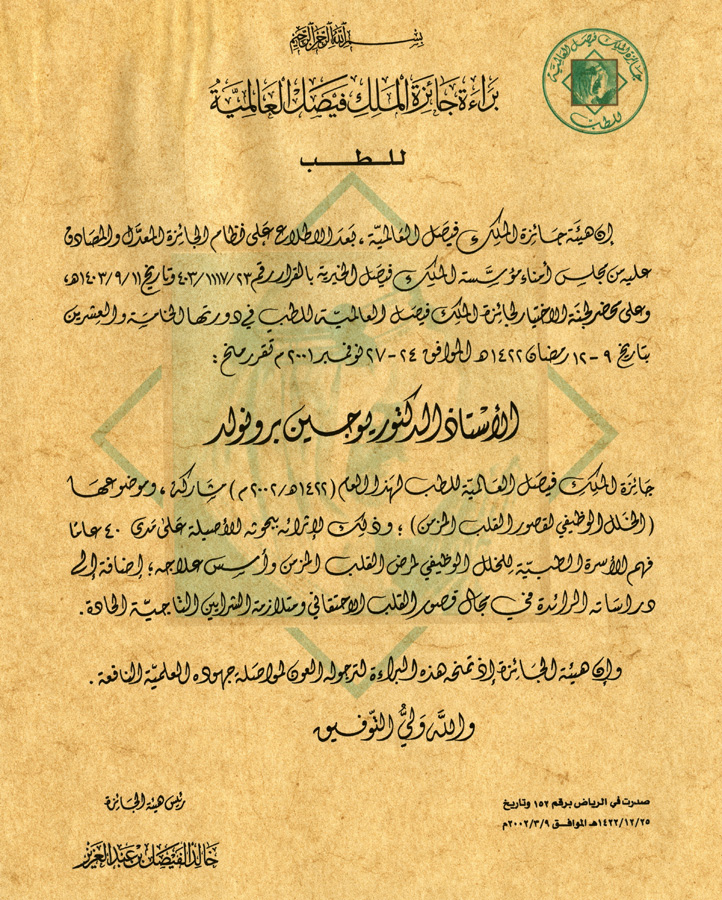

Professor Eugene Braunwald
King Faisal Prize in Medicine 2002 Laureate
Topic: "Pathophysiology of Chronic Heart Failure "
I consider the war against heart disease and heart failure to be a noble war

Eugene Braunwald moved to the United States in 1939. He received his B.A. and M.D. (Honor) from New York University in 1949 and 1952 respectively, and completed his residency in Cardiology at Johns Hopkins University in 1958. In 1968, he joined the University of California, San Diego, where he was the founding Chair of the Department of Medicine and served as Chief of Cardiology and Clinical Director at the National Heart, Lung and Blood Institute. From 1972 to 1996, he chaired the Department of Medicine at the Peter Bent Brigham Hospital in Boston, MA. He was the President of the American Society for Clinical Investigations and the Association of Professors of Medicine. He is currently Distinguished Heresy Professor of Medicine at Harvard Medical School, Faculty Dean for Academic Programs at Brigham and Women’s Hospital and Massachusetts General Hospital in Boston, and Academic Head of Partners in Healthcare System.
Professor Braunwald is at the forefront of investigators of congestive heart failure and acute coronary syndromes. Over the past 40 years, he conducted pioneering research on the hemodynamic response to surgical correction of valvular disorders; he also developed pioneering diagnostic techniques and discovered the clinical entity of idiopathic, hypertrophic subacute stenosis. His groundbreaking studies on the role of the autonomic nervous system and its mediators in the physiologic adjustments to heart failure and the mechanisms of contraction of the normal and failing heart had profoundly influenced present knowledge of the pathophysiology of congestive heart failure. Professor Braunwald also made seminal contributions to the treatment of heart failure, leading to large-scale clinical trials that altered treatment strategies worldwide. He was also instrumental in running the “Thrombolysis in Myocardial Infarction” studies, which developed the concepts of thrombosis superimposed on atherosclerosis as the pathological bases for acute myocardial infarction.
Professor Braunwald’s work dramatically expanded knowledge of heart disease in the areas of congestive heart failure, coronary artery disease, and valvular heart disease. Professor Braunwald received countless awards and honors, including eight honorary doctorate degrees. He was the recipient of the Distinguished Scientist award from the American College of Cardiology in 1986 and the Research Achievement Award of the American Heart Association in 1972. He is an Honorary Fellow of the Royal College of Physicians in Britain and the American College of Chest Physicians and the only cardiologist who is a member of the National Academy of Sciences, In 1996, Harvard University incepted the Eugene Braunwald Professorship in Medicine as a permanently endowed chair, and in 1999 the American Heart Association incepted the annual Eugene Braunwald Academic Mentorship Award in his honor.
He contributed to thousands of publications. He was the founding editor of the premier cardiology textbook, Heart Disease: A Textbook of Cardiovascular Medicine, and editor-in-chief of the leading textbook Harrison’s Principles of Internal Medicine, as well as editor of two distinguished cardiovascular textbooks. He is also Editor-in-Chief of MD Consult Cardiology.
Professor Braunwald and his colleagues explored, identified, and established the role of the sympathetic nervous system in congestive heart failure. They developed a novel model in animals for congestive heart failure that has been used by many Laboratories to evaluate pathophysiologic studies and effects of therapy. Professor Braunwald was amongst the first to delineate the importance of idiopathic hypertrophic subaortic stenosis and the physiologic abnormalities of this myopathic process. He and Robert Kioner were the first to develop the concept of post- Ischaemic left ventricular dysfunction after temporary reduction and coronary flow. This key concept relating to reversible left ventricular dysfunction, its causes, consequences and opportunities for modulation remains a contemporaneously important issue.
This biography was written in the year the prize was awarded.
- He received 23 honorary degrees from distinguished universities throughout the world, including the University of Rochester and the University of Oxford.
- He received the Lifetime Achievement Awards of the American College of Cardiology in 2010.



